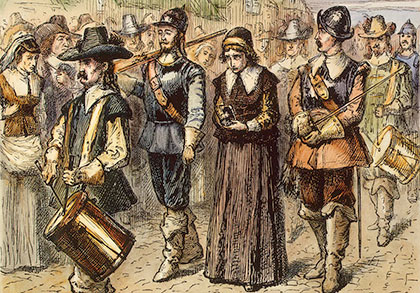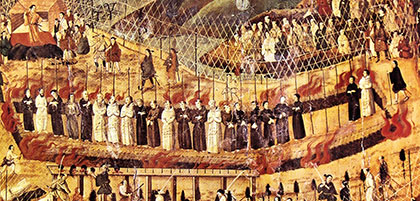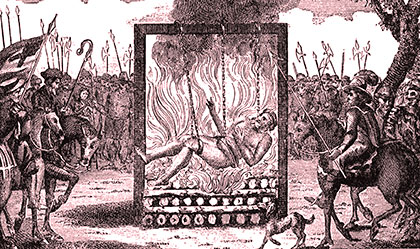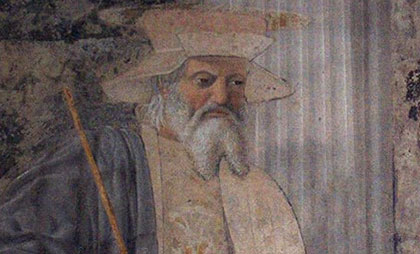
[ABOVE—Quaker evangelist Mary Dyer is led to execution in Boston. Image from the Library of Congress.]
After the Reformation, Christian sects multiplied at a dizzying pace. The rich panoply of modern varieties of Christianity came into flower and was reflected in prison literature.
Unfortunately, sects persecuted sects, especially in those nations with state-run churches—as these accounts show. Except for John Donne, imprisoned in retaliation for his elopement with a powerful man’s daughter, the missionary Adoniram Judson imprisoned on false accusations of spying, and Silvio Pellico, who engaged in subversive activities, all of these prisoners found themselves incarcerated for faith. Pellico finds a place in these pages because of the determination he formed early in his imprisonment to live as a Christian.
John Brown is a difficult case. His faith drove him to attempt to raise a slave insurrection. Taking up arms against Virginia, he met a predictable fate. Like Brown, George Thompson was an abolitionist. Unlike Brown, he committed no crime under Missouri law, but only attempted to point slaves in the direction of freedom; for this he spent five years in prison. George Borrow, although engaged in Bible distribution in Spain, did so with an arrogance that seemed to invite the imprisonment that befell him. James Montgomery went to prison less for faith than for the conscientious reportage his faith demanded of him. We include Alexander Cruden’s incarceration in a mental asylum because of his fame as a Bible student. All five are included because they wrote or spoke in prison from a Christian point of view.
Lilburne, Fox, Penn, Evans, and Cheevers were imprisoned for their Quaker witness. Defoe would never have gone to prison had he not been a Dissenter nor would De Laune had he not responded to a challenge to defend Dissenter positions. Alleine, Baxter and Bunyan defied the English government’s regulations against preaching, as did Rutherford. Similarly, the American Baptists James Ireland and John Weatherford defied Virginia’s laws against preaching. Poland’s Baptist pioneer Gottfried Alf also defied orders not to preach.
Marie Durand lived a godly life amidst horrors that would break almost any spirit. The stiff and drawn expression of her portrait in old age shows what a toll her sufferings took on her. Her sole crime was to be the sister of a Huguenot preacher.
Our last example is a man with no name, but a heart of joy. The Inspector of Forests demonstrated what real Christianity is all about. Entries are listed chronologically by year of death.
John Donne (1572–1631) Adds an Epigram to Prison Literature
Richard Baker (1568–1645) in Debtors Prison
Hugo Grotius (1583–1645) Defends Christianity While in Prison
John Lilburne (c. 1614–1657) Writes His Testimony While Incarcerated
Samuel Rutherford (1600–1661) Admonishes His Congregation from Exile
Joseph Alleine (1634–1668) Encourages Feeble Christians from Prison
De Laune (d. 1685) Done to Death
John Bunyan (1628–1688) Pens His Second Best Book While a Prisoner
Richard Baxter (1615–1691) and His Wife Set up House in Prison
George Fox (1624–1691) Describes the Disgusting Prison Conditions He Endured
Katherine Evans (died 1692) and Sarah Cheever (17th century) Write Home While Held by the Maltese Inquisition
Hans Burki (fl. 1710) Describes His Brutal Incarceration
William Penn (1644–1718) Helps Establish the Right to a Jury Trial
Daniel Defoe (1659–1731) Glorifies the Pillory, Instrument of His Shame and Punishment
Alexander Cruden (1699–1770) Urges Reform of Insane Asylums
Marie Durand (1715–1776) Immured 38 Years for Her Huguenot Faith
James Ireland (1745–1806) Endures Insult in Prison for Preaching as a Baptist
John Weatherford (c. 1740–1833) Preached from His Prison Cell Window
Adoniram Judson (1788–1850) Tortured in Burmese Prisons
James Montgomery (1771–1854) Frisks Along a River Bank Following His Release from Jail
Silvio Pellico (1789–1854) Determines to Live as a Christian in Prison
John Brown’s (1800–1859) Final Speech and Prophecy Before Hanging
George Borrow (1803–1881) Threatens an International Incident when Held in Spanish Prison
George Thompson (died 1893) Pens Praise Poems in Prison
Gottfried Alf (1831–1898) Was in and out of Polish Prisons
Inspector of Forests (Late Nineteenth Century) Exhibits Joy in a Chain Gang








